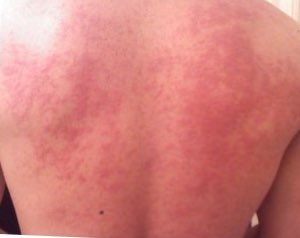Irritation
Tissue irritation is a physiological response manifested by the onset of inflammation, pain, or other discomforting reactions due to various stimuli, including allergies, cellular damage, or external irritants. It can significantly impact different tissues in the body, with the skin and eyes being commonly affected.
Definition[edit | edit source]
In the context of biology, irritation refers to an unpleasant sensation, often characterized by inflammation or pain. It's typically a defensive response to harmful stimuli, aiming to remove or minimize the adverse effect of the irritant.
Causes[edit | edit source]
Irritation can be triggered by several factors:
- Physical irritants: Including heat, cold, radiation, or physical trauma.
- Chemical irritants: Such as detergents, solvents, or other chemicals that come in contact with the skin.
- Biological irritants: Like pathogens, insect bites, or plant toxins.
- Allergies: Hypersensitive reactions of the immune system to specific substances.
- Cellular damage: Damage at the cellular level can lead to inflammation and irritation.
Common Symptoms[edit | edit source]
- Redness: Often one of the earliest signs of irritation.
- Swelling: Caused by an accumulation of fluid in the tissues.
- Pain: Varying levels of discomfort or painful sensations.
- Heat: The affected area might feel warm to the touch.
- Itching: An unpleasant sensation leading to the desire to scratch.
Prevention and Treatment[edit | edit source]
Avoiding known irritants is the primary preventive measure. However, once irritation occurs:
- Cooling: Using cold compresses can reduce inflammation.
- Topical creams: Creams or ointments containing corticosteroids or other anti-inflammatory agents.
- Antihistamines: Useful in cases where the irritation is due to an allergic reaction.
- Moisturizing: Helps soothe the skin and prevent further irritation.
- Avoidance: Keeping away from the irritant or allergen causing the issue.
See Also[edit | edit source]
This article is a dermatology stub. You can help WikiMD by expanding it!
Search WikiMD
Ad.Tired of being Overweight? Try W8MD's NYC physician weight loss.
Semaglutide (Ozempic / Wegovy and Tirzepatide (Mounjaro / Zepbound) available. Call 718 946 5500.
Advertise on WikiMD
|
WikiMD's Wellness Encyclopedia |
| Let Food Be Thy Medicine Medicine Thy Food - Hippocrates |
Translate this page: - East Asian
中文,
日本,
한국어,
South Asian
हिन्दी,
தமிழ்,
తెలుగు,
Urdu,
ಕನ್ನಡ,
Southeast Asian
Indonesian,
Vietnamese,
Thai,
မြန်မာဘာသာ,
বাংলা
European
español,
Deutsch,
français,
Greek,
português do Brasil,
polski,
română,
русский,
Nederlands,
norsk,
svenska,
suomi,
Italian
Middle Eastern & African
عربى,
Turkish,
Persian,
Hebrew,
Afrikaans,
isiZulu,
Kiswahili,
Other
Bulgarian,
Hungarian,
Czech,
Swedish,
മലയാളം,
मराठी,
ਪੰਜਾਬੀ,
ગુજરાતી,
Portuguese,
Ukrainian
Medical Disclaimer: WikiMD is not a substitute for professional medical advice. The information on WikiMD is provided as an information resource only, may be incorrect, outdated or misleading, and is not to be used or relied on for any diagnostic or treatment purposes. Please consult your health care provider before making any healthcare decisions or for guidance about a specific medical condition. WikiMD expressly disclaims responsibility, and shall have no liability, for any damages, loss, injury, or liability whatsoever suffered as a result of your reliance on the information contained in this site. By visiting this site you agree to the foregoing terms and conditions, which may from time to time be changed or supplemented by WikiMD. If you do not agree to the foregoing terms and conditions, you should not enter or use this site. See full disclaimer.
Credits:Most images are courtesy of Wikimedia commons, and templates, categories Wikipedia, licensed under CC BY SA or similar.
Contributors: Prab R. Tumpati, MD




